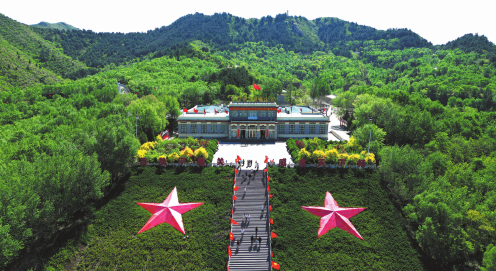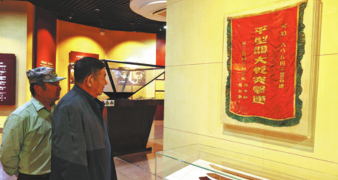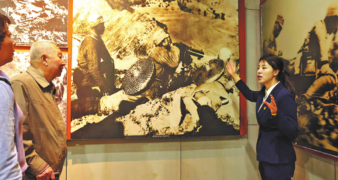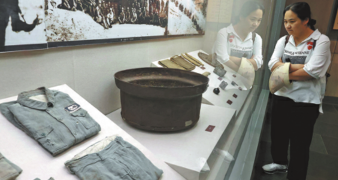Echoes of history still resonate
Major anniversary sees visitors flock to site of key victory against Japanese wartime aggression, Li Yingxue and Zhu Xingxin report in Datong, Shanxi.

In early autumn of 1937, as war loomed over northern China, Zeng Huai fled into the mountains with others from Baiyatai village, a small hamlet in Lingqiu county, in what is today Datong, Shanxi province.
The Japanese army was advancing fast, and fear spread like wildfire — within days, they had massacred over 1,200 villagers. Days later, Zeng crept back down to the village to retrieve some supplies — and came face to face with a soldier from the Eighth Route Army.
Terrified, he froze — until the soldier gently said to him, "We don't hurt people."
That simple sentence stayed with Zeng for life. The soldiers asked him to lead them into the hills — and soon, the echoes of gunfire rolled through the valleys.
From his hiding place among the rocks, Zeng caught glimpses of chaos in the nearby gorge: Japanese convoys ambushed, explosions lighting up the narrow mountain pass, the air thick with smoke and grit.
It was Sept 25. That day, the 115th Division of the Eighth Route Army, led by the Community Party of China, launched a bold surprise attack at Pingxingguan, delivering the first major Chinese victory of the Chinese People's War of Resistance Against Japanese Aggression (1931-45).
Poorly equipped, thinly clothed, and armed with a limited number of grenades, the soldiers relied on fierce determination — and shattered the myth of Japanese invincibility. News of the Pingxingguan Victory electrified a nation in despair.
Decades later, Zeng's grandson, Zeng Fusheng, still remembers his grandfather taking him to visit the old battlefield when he was a child.
"My grandfather told me how he and four soldiers hid under a rock as bullets flew overhead," Zeng Fusheng, now 66, recalls. "I often tell these stories to my children and grandchildren — I'm afraid they'll forget."
This year marks the 80th anniversary of the victory of the Chinese People's War of Resistance Against Japanese Aggression, and the Pingxingguan Victory Memorial Hall, located in Baiyatai township, Lingqiu county of Datong, is seeing a surge in visitors.
Tour guide Yuan Jing notes that since April, there has been a noticeable increase in student groups, red tourism, and outof-town visitors.
"Many tourists are interested in the details of the battle," Yuan says, "especially the ambush tactics, the troop strength comparison between the two sides, and key moments like the ambush at Qiaogou.
"People often ask how this battle shattered the myth of Japanese invincibility and what impact it had on national morale during the war," Yuan explains. "They also want to know stories about the commanders and the sacrifices of ordinary soldiers."
Among the visitors was 34-year-old Wang Yonggang, a local from Datong. Clearly moved, he shared his thoughts after touring the memorial. "I was especially interested in the captured enemy equipment on display — it shows just how poorly equipped our forces were by comparison, and how difficult this victory really was.
"I had learned about the battle from my father, but seeing the site in person gave me a whole new perspective," Wang adds.
One of the most compelling attractions is Qiaogou — the main battlefield of the Pingxingguan Victory which wiped out over 1,000 Japanese soldiers. The Qiaogou valley stretches four kilometers in a northeast-southwest direction, with rugged terrain and steep cliffs ranging from 10 to over 100 meters deep. The ancient road running through the gorge is only three to five meters wide, just enough for a single truck to pass. On both sides are sheer rock walls, with relatively gentle slopes above.
Wang Jiyong, director of the Cultural Relics Protection and Research Center in Lingqiu, explains that Qiaogou's steep cliffs once formed a natural "pocket trap" — perfectly suited for an ambush.
"When Japanese supply convoys entered the gorge, there was no way out. It became the ideal battlefield for the Eighth Route Army," he says.
"It was the Eighth Route Army's first direct engagement with Japanese forces after crossing the Yellow River, the Chinese army's first victory in the full-scale resistance, and a resounding win that inspired people across the nation."
Though erosion has softened the slopes over the past 80 years, Wang Jiyong says efforts are underway to preserve the site's historical contours — reinforcing vulnerable areas and adding markers. "We want future generations to grasp both the tactical brilliance and the harsh conditions of that fight."
Among the over 300 exhibits housed at the Pingxingguan Victory Memorial Hall, Yuan finds one item especially poignant: a leather satchel once belonging to martyr Zhang Wensong.
Zhang was the political instructor of the 1st battalion, independent regiment, under the 115th Division of the Eighth Route Army. Before the Pingxingguan campaign, he was stationed at the home of Meng Dehai, the young head of the local children's militia. The two forged a deep bond.
On the afternoon of Sept 23, 1937, after attending a meeting, Zhang returned to pack for what he sensed would be a brutal battle. Feeling the weight of what lay ahead, he handed his ever-present leather satchel to young Meng for safekeeping — a quiet gesture of trust. He never came back.
Zhang died heroically days later in the fierce fighting at Yimaling, a battle to stop Japanese reinforcements to Pingxingguan. The satchel remained with the Meng family. In 1995, before she passed, Meng's mother entrusted the satchel to her son, urging him to protect the fallen soldier's belongings with care.
After joining the revolution, Meng Dehai kept the satchel with him at all times. In 1997, upon retiring and returning to his hometown in Lingqiu county after decades in the Inner Mongolia autonomous region, he handed over the bag — preserved for 60 years — to the county's Party history research office.
"This artifact is historically unique," Yuan explains. "It is the only known wartime satchel of an Eighth Route Army grassroots commander that was entrusted to a civilian, survived the flames of war, and has remained intact to this day.
"What moves me most is the satchel's 60-year journey — a relay of loyalty and trust across two generations," Yuan says. "It's more than an object. It symbolizes the profound bond between the army and the people. The Eighth Route Army protected civilians with their lives; in turn, civilians guarded the legacy of the fallen with theirs. That mutual sacrifice — that shared will — is the soul of China's wartime spirit."
Zhao Youwen, director of the Pingxingguan Victory Memorial Hall, notes that since the site opened to the public for free in 2008, annual visitor numbers have steadily increased. Last year, the memorial welcomed 470,000 visitors, and the number is expected to be even higher this year.
"We've cohosted exhibitions, like For Justice and Peace: International Friends in the Wuhan Resistance, with the Memorial Hall of the Former Site of the Wuhan Office of the Eighth Route Army. We're planning an academic symposium this September to mark the 80th anniversary of victory of the war," Zhao says.
Bai Lu, director of the culture and tourism bureau of Lingqiu county, emphasized that in this anniversary year, conservation efforts are in full swing as the Pingxingguan site is a national key cultural relics protection unit. Emergency reinforcement of Qiaogou is underway, along with security and infrastructure upgrades at the Pingxingguan site.
"A large-scale historical reenactment of the Pingxingguan Victory is also in preparation," Bai adds. "Preserving these red heritage sites is key to honoring revolutionary history, and to revitalizing the local economy."
In Baiyatai, amid the mountains where smoke once rolled through the gorge, the echoes of history remain — carried not just in stone and satchel, but in the stories passed from one generation to the next.






Today's Top News
- China's industrial profits down 1.8% in H1
- Thailand responds to Trump's ceasefire call
- Recall vote shows DPP's manipulation runs against Taiwan people's will: mainland spokesperson
- Top DPRK leader visits China-DPRK Friendship Tower
- China proposes global cooperation body on AI
- Scholars propose inclusive human rights framework






























